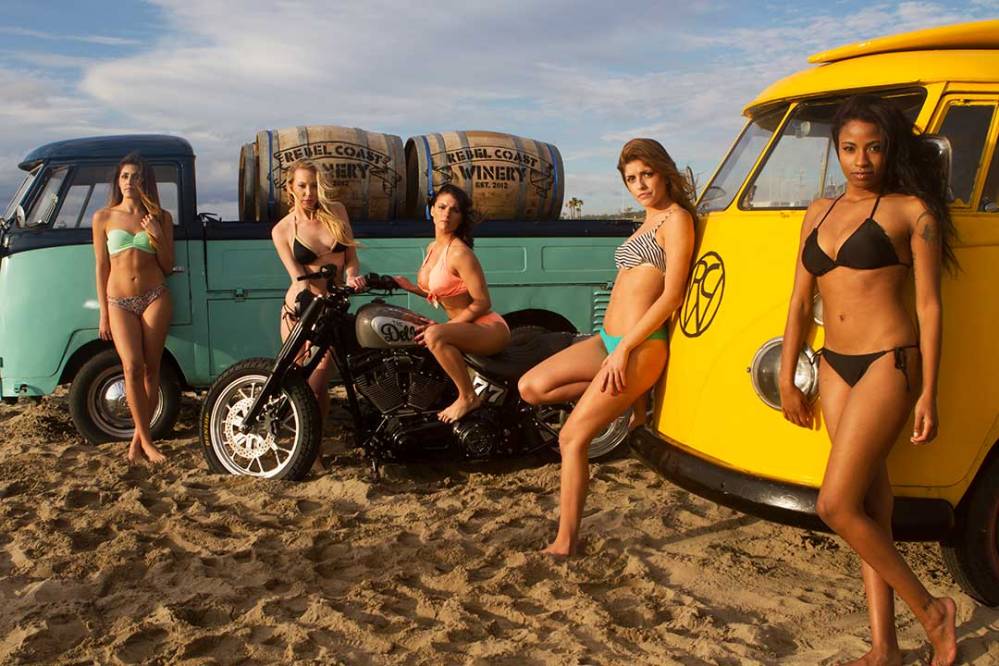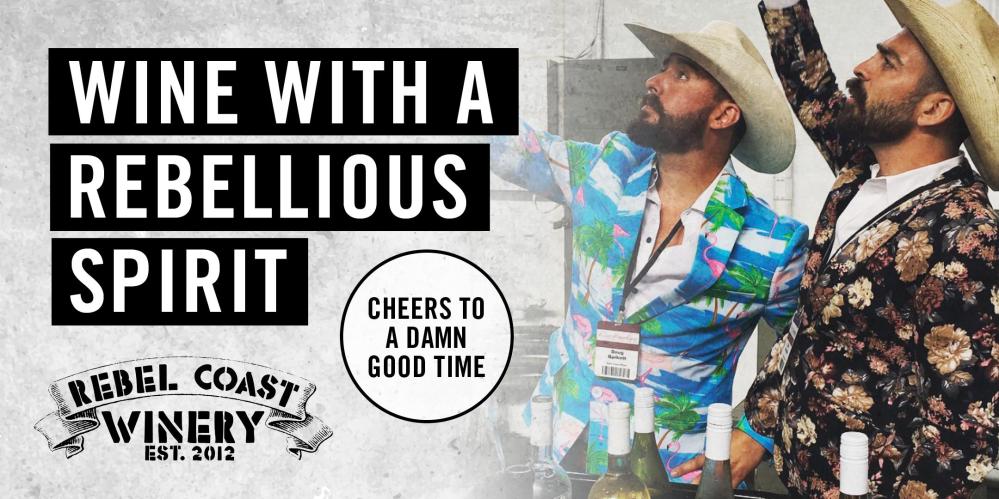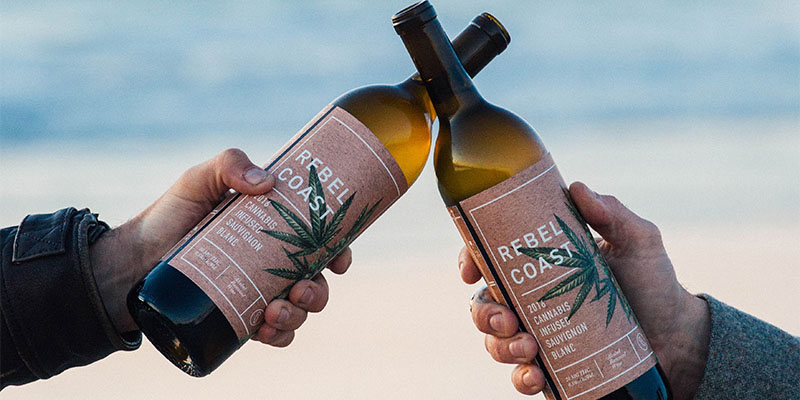When 60’s folk icon Bob Dylan wrote “….everybody must get stoned,” he could never have imagined a counter culture drug would be so common, so regulated, sooooo corporate. But here we are at the end of 2017, pot will be legal in California come January and across Canada by July 1st.

Riding into the middle of that sweeping change are the trailblazing wine bros from Rebel Coast Winery. They’re all about selling good times; their over-the-top marketing tactics a wantonly twisted celebration of over-indulgence, promiscuity and reckless consumption. It’s a millennially targeted strategy that’s worked for them, distancing the brand from the 99.9% of wine marketers who elect to play it safe. Maybe it’s best to describe their approach as corporatized rebellion.
I met the team from Rebel Coast Winery (who you met in part 1) at the Wine Bloggers Conference in Santa Rosa last month when they poured their soon-to-be released Marijuana Infused Sauvignon Blanc. Prop 64 in California in 2016 has sanctioned the recreational production, distribution and sale of weed to adults 21 years of age within the state, starting January 2018.

Rebel Coast is leading the charge in the THC infused/alcohol-free wine market (you can’t legally mix the two in the recreational market). The team is hoping to convert their young, faux rebellion-seeking consumers into pot wine fans. They provide handy dosing advice in case the 4 mg per serving restrictions don’t give you the buzz you’re looking for. “If you want to get really stoned– take some dabs” their website generously advises. (Really? – yes really.)
This manufactured rebellion sometimes feels a bit much – and somewhere along the way social responsibility is going to have to kick in (either self-imposed or legally mandated).

CSR – MIA
There is not a whit of ‘corporate social responsibility’ in any of the messaging to date from the team at Rebel Coast (sorry guys – a $59 price point on your wine isn’t a CSR strategy). Their recent cannabis wine press release does encourage consumers to “enjoy responsibly” but it’s a bit hard to reconcile that copy line with that “take some dabs” advice (great articles from Leafly here and here on safe dosing and what’s called ‘impairment honesty’ or “how stoned will I get?”).
Rebel Coast is first out of the gate with their weed wine, and those who follow in California may decide to take a more moderate approach. Meanwhile here in boring, and highly regulated old Canada (a framework GIFT for pot marketers, btw), a public awareness campaign is trying to get ahead of the legalization fervour around pot’s decriminalization. It’s about 180 degrees away from Rebel Coast. Here the campaign reminds us that five teens were killed in a car crash near Ottawa when the driver chose to drive high: the sobering, un-sexy reality of participating in a category – pot….wine….beer…..spirits – that has consequences attached to consumption.

And those are really the two solitudes when it comes to cannabis messaging: the stoney baloney, party-hearty stoner culture that feeds and reinforces the most prominent stereotypes and stigmas around pot consumption; and the “have fun but do it responsibly understanding the consequences” stream of promotion, which we can expect to roll out here soon.

There’s also a third – the medicinal stream: promoting cannabis as a professional, measured and important alternative to pharmaceuticals and drugs. In some ways it’s been the most eye opening since I started researching this story. The reality is, a significant and growing segment of the pot market is made up of people who use cannabis as a therapeutic product. Whether it’s to treat stress, seizures, chemotherapy symptoms, insomnia, or ease chronic pain, they’re opting for weed instead of resorting to heavily addicting and often debilitating prescription drugs. With a North American epidemic of opioid-related overdoses claiming the lives of more than 2,800 Canadians and 64,000 Americans last year (the leading cause of death for Americans under 50), there is hope cannabis liberalization can help combat this problem.
The times, they are a changin’
Recreational access to cannabis will create a whole new roster of household brand names (think: Coke, Pepsi, Tylenol, …..Yellowtail !!), as it moves from the estimated $7 – $10 Billion-dollar black market, to legal status. California joins Oregon, Colorado, Maine, Washington, Massachusetts, Nevada and Alaska as states where recreational pot consumption is now an option to adults 21 years of age. Canada – including all provinces and territories – will join these piecemeal U.S. states in July 2018, although it’s clear there is already tremendous cross-border, business integration and shared learning between the two countries.

Sensing these concerns, many of the large cannabis producing companies are jumping on the social responsibility and accountability bandwagon before they enter the recreational cannabis market.
Canopy Products – the Canadian company that Constellation invested in earlier this year – and described as the Proctor and Gamble of the cannabis world – plans to roll out their own weed wine, weed beer and weed spirits in the next few years. They’ve partnered with the Canadian Drug Policy Coalition (CDPC) and Mothers Against Drunk Driving (MADD Canada) to focus on impairment education. They’re also investing in cannabinoid “indications” research to better quantify the benefits of specific cannabis strains and chemicals with medical conditions (Parkinson’s, arthritis, etc). Turning ingredients into outcomes will help bring insurance companies on board, which makes me wonder if we’ll all be claiming weed wine as a medical deduction (darned knee)!!

Another company called Beleave, is working with RIDE Checks in Canada to raise awareness around the dangers of driving high (DUID – Driving Under the Influence of Drugs). Their research indicates roughly 500,000 Canadians admitted to driving after using cannabis, and nearly 40% of them are between the ages of 15 and 24.
These numbers are expected to increase in Canada following the legalization of recreational marijuana next summer. Beleave worked with an advertising agency to create a YouTube series and print campaign featuring three new “consequence strains”: Kourtoom Kush, White Whiplash and Slammer Time. Of course, following the weed category practice of creative name generation, each strain of cannabis points to the potential tragic consequences of driving under the influence of marijuana.
Andrew Freeman, called the Pot Czar, was director of marijuana coordination in Colorado, when pot was legalized in 2014. He says there are things he wishes Colorado had done differently. They include starting its public education campaigns sooner to avoid the lag between easier access to pot in all its forms, and increased public awareness of the potential harm of driving high. Clearly, Canadian manufacturer’s entering the rec market are heeding his advice…..
So where does this leave the wine industry?
Whether you’re for or against legalization, the cannabis market will soon include recreational wine offerings that will need to be regulated. The fun guys at Rebel Coast have blended a marijuana-infused Sonoma Valley, Sauvignon Blanc and they’re perfectly positioned to pair their winemaking experience with the social, recreational benefits of weed.
I didn’t much like their Sauvignon Blanc, but I can’t imagine Chip and company are losing any sleep over my tasting notes.

The team at Rebel Coast have ALSO indicated Canada is on their radar, with their future product line expanding to include crowd favourites, Rosé and Champagne (I know, I know …sparkling, but it’s their word – not mine!!!!) With conglomerate Constellation Wines saying they’ll only move into the weed wine category once federal laws are opened up to recreational cannabis use (not happening anytime soon in the U.S. where the states control alcohol and weed), we will likely see pot-embracing Canada as the next great weed wine test market.
In the meantime, in the middle of this emerging $7 Billion dollar Golden State pot pie, is the wine industry. What’s clear is despite years of regulation and social responsibility messaging, the wine industry in California – and Canada – will have to revisit this new spin on wine, including all the critical distribution and marketing best practices that go with it. There’s not much time to get their heads around it before cannabis infused wine hits the market.
Meantime the “rebels” at Rebel Coast will have to decide whether they keep pushing the “rad” or come around to the “trad”….and the clock is ticking.
*Technically, pot wine or green wine as it’s often called, has been produced in Santa Barbara County for many years using the legal medical term, “tincture”. Singer Melissa Etheridge, a cancer survivor, has been a leading proponent of mellow, physical “body high” vs more disorienting “head high”, wines (releasing gentler cannabinoids vs THC’s more psychoactive substance). Her wine’s content combines 12% alcohol and 3% THC which is legal under medical marijuana laws, but won’t be in the recreational market. To purchase her wine, imbibers require a medical recommendation from a physician.
Feature image photo credit: Rebel Coast Winery

2 Comments Add yours